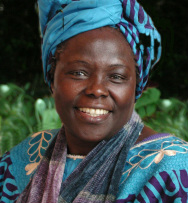But that verdict has been echoed by thousands of supporters over the years to describe Africa's first female Nobel peace prize-winner. Brought up in a village in Kenya's central highlands, she was educated by nuns before joining Barack Obama's father as one of 300 Kenyan students given scholarships in the US in 1960. Maathai, 70, became the first east African woman to hold a doctorate, and a job offer at the University of Nairobi was withdrawn because she was seen as too ambitious for a woman. She found a job in a different department, before becoming furious at the sexism that saw her paid less than male academics, and denied pensions and medical insurance for her children. In 1977, she started encouraging village women to plant trees to prevent deforestation and provide them with fuel. "Women from the countryside [in Kenya] were talking about how they did not have enough food because their land had been converted into cash crops," she explained. So far, 45m have been planted in Kenya alone under her Green Belt Movement, for which she received the Nobel prize, and 7bn worldwide in the UN program she patronised.
Maathai was beaten and jailed for her protests against President Daniel Arap Moi's government, including its plans to build a 60-storey government building in the middle of Uhuru Park in central Nairobi. In the end her campaign was successful, and she went on to win a seat as an MP, with a whopping 98% of the vote.
Social justice, democracy and the environment are intrinsic to her campaigns. And she has spoken out about the "new colonisation" that has seen the continent sell off its natural resources to fund infrastructure such as roads. In 2006, she helped found the Nobel Women's Initiative to push for peace, justice and equality around the world. One panellist said: "Her contribution to sustainable development, democracy and peace is astounding."
Written in March 2011 by Homa Khaleeli for The Guardian.
In late 2011, Maathai died of complications from ovarian cancer.


 RSS Feed
RSS Feed